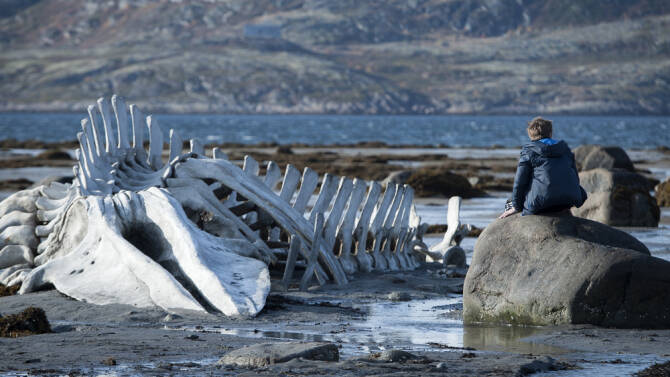Rocks and angry, smashing waves. The film opens and closes on a dismal wilderness of a northwestern Russian seacoast where, to the roar of a funereal organ, the foaming surf smashes against the cliffs. The rotting skeletons of wrecked ships litter the sand and crumbling wharves, while, like the skeleton of a prehistoric monster in a museum, the giant ribs of a long-dead whale curve upward like a ghost or a pagan god delivering a message that has not yet sunk in.
A light shines from the kitchen of an old house and garage where Kolya (Aleksey Serebryakov) a mechanic, Lilya (Elena Liadova), his second wife, and his adolescent son Roma (Sergey Pokhodaev) struggle to live decently—Kolya fixing cars, Lilya toiling on an assembly line to decapitate fish, and the emotional Roma traveling back and forth to school. Koyla slaps Roma in the face when he talks back and drinks vodka to relieve his tensions, which are constant. He is hot-headed, unsophisticated, a middle class Russian who loves his house and his gun and is headed for trouble.
The trouble is the corrupt mayor, Vadim (Roman Madianov), a short, round, brutal fraud who has decided to seize Kolya’s home and replace it with his own luxury dacha; and Kolya, determined to hold onto his property, has invited his old army buddy Dimitri (Vladimir Vdovichenkov), a slick world-wise lawyer from Moscow, to save him. Dimitri has investigated Vadim’s background and arrives with enough dirt, he thinks, to blackmail him into submission. But he has also come to seduce Lilya, and this betrayal triggers a series of events that spread sin like an Ebola virus, dragging down the innocent and strengthening the local and national regime determined to keep everyone socially frozen in place.
Remarkably the film has the support of the Ministry of Culture of the Russian Federation of Cinema and the Arts; for, like all great art that is always about something else, “Leviathan” is a sweeping condemnation of Russian economic and political life, where the citizens stay soaked in vodka to ease the constant pain. (The film opens in select cities on December 31.) When Kolya and friends go on a shooting-drinking holiday they bring their rifles and portraits of Russia’s recent presidents as targets. When the teenagers hang out and drink beer secretly at night they hide in the ruins of a church. The Orthodox bishop tells the gangster mayor he is doing God’s will. When the local court, three women in robes, delivers verdicts that crush Kolya, the judge rattles off the verdict like a machine gun. When the mayor and his co-criminals conspire, Putin stares down from the wall.
As grim and tragic as director Andrey Zvyagintsev’s portrait of his country is, he does not squeeze out hope. A vehicle has a line of holy cards on the dashboard. Characters are pushed from time to time to admit whether they go to church and confession. Koyla struggles to forgive his wife’s infidelity. His son tells him to quit drinking. When Kolya goes to the store to buy more vodka he meets an ordinary orthodox parish priest who is buying bread; they talk, and the priest tells him the story from Job of the Leviathan, a sea monster who symbolizes cosmic disorder, whom only God can subdue—and Job survives to live a prosperous life with a new family. But at the end the worldly bishop delivers a long pompous homily in which he claims that the church is the soul of the Russian people, that the church (himself) is the main source of truth. The fat mayor is in the front row and the simple priest is in the back.
In a director’s note distributed to the press, Zvyagintsev warns that the spiritual power of the state over man knows no limit. “We will all be faced one day with the following alternative: either live as a slave or live as a free man. And if we naively think that there must be a kind of state power that can free us from that choice, we are seriously mistaken. In the life of every man, there comes a time when one is face with the system, with the ‘world.’ And must stand up for his sense of justice, his sense of God on earth.”








